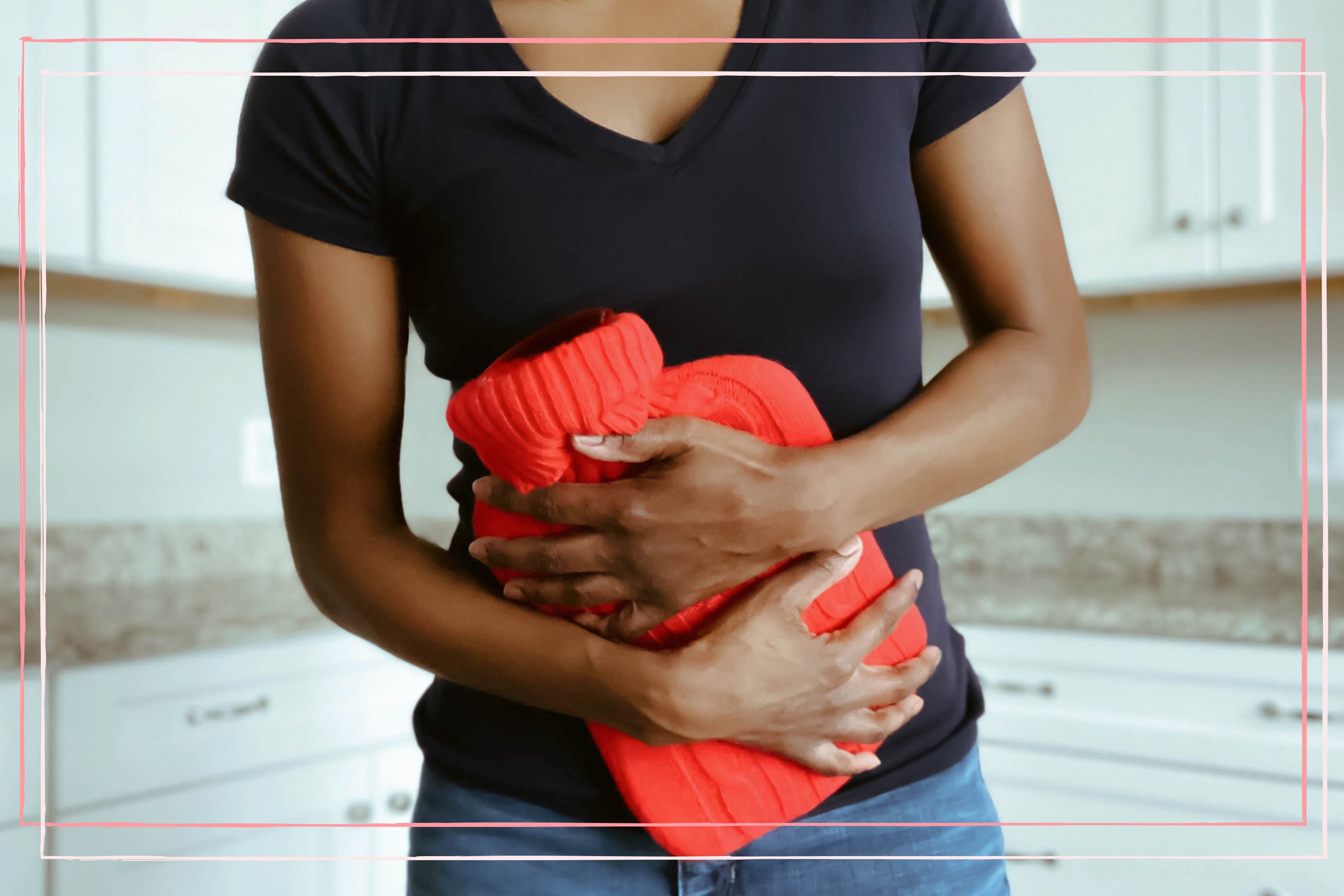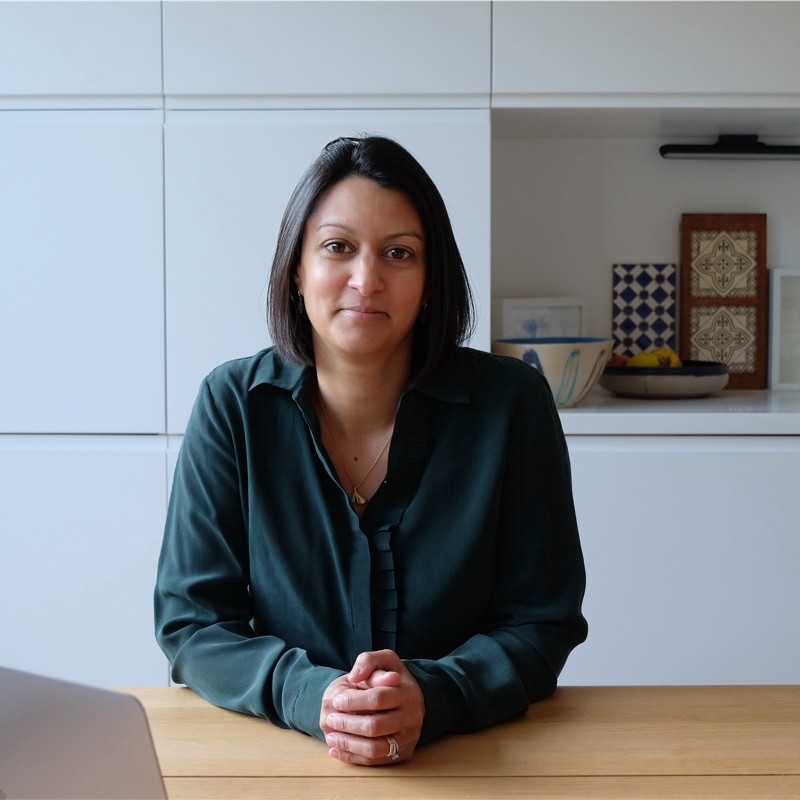12 doctor-recommended period pain remedies to help relieve bad period cramps and ease discomfort
Three doctors recommend period pain remedies that will provide relief for period cramps and help to soothe bad menstrual cramps at home.

Rose Goodman

Whether you find period cramps simply distracting or completely debilitating, having period pain remedies to hand can help reduce and relieve bad cramps, soothe pain and ease discomfort when you need it most.
Whilst all of our bodies are different, period pain is very common and around 80% of women will experience it as some point in their lives. The medical name for the pain caused by our periods is dysmenorrhoea, which comes from an ancient Greek phrase that translates as 'difficult monthly flow'.
Usually, period pain will feel like painful muscle cramps in the tummy, which can radiate to the lower back and thighs. Knowing some effective and doctor-recommended remedies that you can try at home can help make your monthly cycle less painful and hopefully less debilitating too.
Although the below period pain remedies have all been recommended to us by doctors and qualified professionals, you should always see your GP to discuss your symptoms.
Period pain remedies to help relieve bad period cramps
1. Use a hot water bottle to reduce period pain
It's one of the most common and well-known period pain remedies for a reason and Dr Claire Phipps, Women’s Health GP at London Gynaecology, says that you should never, "underestimate the power of a hot water bottle" when it comes to relieving cramps.
"Fill a hot water bottle with warm (not boiling) water and place it on your lower abdomen or lower back where you feel the cramps," recommends Dr Phipps. "You can also wrap the hot water bottle in a towel to prevent direct contact with your skin if it feels too hot."
2. Take a warm bath
Like using a hot water bottle, having a bath with warm water can also help ease period pain. Dr Phipps explains, "taking a warm bath can help relax your entire body, including the muscles in your abdomen and back."
Parenting advice, hot topics, best buys and family finance tips delivered straight to your inbox.
To make the bath even more relaxing, which in turn can help ease discomfort caused by menstrual cramps, Dr Phipps suggests, "add some soothing essential oils [to the bath] like lavender or chamomile to enhance relaxation."
3. Use heat therapy
Heat therapy is an effective way of easing period pain and there are other period pain remedies using heat you can try in addition to a hot water bottle and a warm bath.
"Heat therapy can help to relax the muscle of the uterus and alleviate the intensity of menstrual cramps," Dr Phipps explains. She recommends trying the following in addition to warm baths and hot water bottles:
- Heating Pad: If you don't have a hot water bottle, you can use a heating pad set on low to medium heat and place it on your lower abdomen or lower back. Make sure to follow the manufacturer's instructions for safe use.
- Warm Compress: Soak a towel in warm water, wring out the excess water, and then place it on your lower abdomen or lower back. You can reheat the towel as needed to maintain warmth.
4. Exercise if you feel up to it
Exercise helps to relieve period cramps through the brain’s release of endorphins - the body's ‘feel-good’ hormones. These block the brain’s pain receptors, meaning the pain signals coming from your contracting uterus will be stopped.
Exercise also improves circulation throughout your body, including your uterus. When you experience period cramps, your uterus is contracting so hard that it is cutting off some blood flow, which sends pain signals to the brain. Increased circulation can help open up these blood vessels and relieve period cramps.
"Research shows that both low-intensity (yoga, walking, etc) as well as high-intensity (aerobics, HIIT – high intensity interval training – etc) exercise both provide significant and equally powerful benefit in terms of period pain, at least for women who don't have an underlying problem such as endometriosis contributing to their symptoms," says GP and medical broadcaster, Dr Sarah Jarvis.
"The benefit seems to be greatest for 45-60 minutes of exercise at least three times a week – although you can still get the benefit if you don't exercise during your period," says Dr Jarvis.
"It is important to note that everyone is different and what works for you might not work for someone else," adds Dr Phipps. "Gentle exercise is often advised alongside other remedies to help with pain, but if your pain is not controlled, it is advisable to seek support from your healthcare professional."
5. Do pilates or yoga if you can manage gentle exercise
"Mindfulness, yoga and meditation are known to provide comfort," for period pain, says Dr Phipps and there are various yoga moves to ease period pain that you can try, including the child's pose and reverse warrior pose.
"Yoga helps to soothe period pain by easing the muscles in your body. It also relaxes your mind through physical poses called ‘asanas’ and conscious breathing exercises called ‘pranayama," says leading yoga teacher, Sarah Highfield. "Yoga helps to sync your mind, body and breath, leaving you feeling calm and balanced. Many people find that gentle yoga stretches just before and during their period help to relieve mild period pain. However, if your period pain is more intense, it may be better to avoid yoga and rest instead."
6. Book a massage
Having a massage can also help relieve period cramps. "Studies show massage therapy can help promote relaxation and help relieve muscle tension," says Dr Jarvis. "But there is also evidence that even among women with endometriosis, who often suffer extremely severe period pains, massage can help relieve period cramps."
If you're just trying out massage at home rather than booking in with a professional, for the best results try massaging your lower abdomen and add essential oils such as clove, lavender and rose.
7. Avoid sugar and dairy
GP Dr Mitra Dutt reveals that what you eat during your period can have an impact, "there are some promising studies which suggest that changing your diet is worth a try for period pain sufferers."
"Nutritional changes, in particular, avoiding sugars and dairy will reduce period pains," explains Dr Phipps.
"Try to avoid foods that exacerbate inflammation, such as oils other than extra virgin olive, foods high in sugar, red meat and alcohol (coffee may also not be a great choice)," says nutritionist Rob Hobson. Avoiding these foods is also a good remedy for PMS symptoms such as bloating: "these foods can also exacerbate bloating which can make cramps feel worse (sipping mint tea can help with bloating)."
8. Incorporate anti-inflammatory foods into your diet
Laura Southern, nutritional therapist at London Gynaecology, suggests introducing anti-inflammatory foods into your diet both before and during your period to help with cramps and pain. “It is useful to include lots of 'anti-inflammatory foods' to help reduce pain, in the run up and during your period - these are foods high in 'essential fats' - so oily fish, nuts, seeds, olive oil, avocado, olives. Try to include a source at each meal.”
9. Get plenty of sleep
Falling asleep and feeling well-rested can feel especially difficult when you're experiencing period cramps, but getting a good night’s sleep is important to help ease period pain. "Getting 8 hours of sleep with regular exercise is very important," for helping to manage period pain, says Dr Phipps.
It’s also important to take steps to improve your sleep and sleep patterns throughout the month, ready to help your period pain when the time comes. "Getting into a routine of going to bed and getting up at the same time (even at weekends) can help. As can a quiet, dark bedroom and banning electronic devices (phones, laptops, TVs) from the bedroom," says Dr Jarvis.
"Plus, try avoiding caffeine after mid-afternoon for a couple of weeks to see if that helps. And don't be tempted to drink too much alcohol, or to drink late at night. Alcohol may help you get off to sleep but that sleep will be less restful and you're likely to wake early."
10. Eat magnesium-rich foods
"Magnesium rich foods might also be supportive as magnesium can help reduce muscle cramps and pain," suggests nutritional therapist Laura Southern. "Magnesium is found in nuts, seeds, wholegrains, green leafy veg and dark chocolate."
GP Dr Mitra Dutt also advises, "making sure you get enough magnesium." She recommends cashew nuts and dark leafy green vegetables like kale as good sources of magnesium.
11. Drink more water
There are many benefits of drinking water and these can include easing period pain.
"Water is essential!" says nutritional therapist Laura Southern. "Studies have shown women who consume more water during their periods experienced less cramps than those who drink less." Laura recommends trying to drink at least two liters of water a day to try and help ease period pain. "Water supports both detoxification and excretion - sparkling water, herbal teas and broths will all add to your hydration levels," adds Laura.
12. Try a TENs machine
A TENs machine is a small, battery-operated device that has leads connected to sticky pads called electrodes. It works by using a mild electric current as a method of pain relief and a small study from 2017 concluded that a TENs machine can be "efficacious" (effective) and “safe in relieving pain”.
The pads are attached directly to your skin. When the machine is switched on, small electrical impulses are delivered to the affected area of your body, which you feel as a tingling sensation. These electrical impulses can reduce pain signals going to the spinal cord and brain, which may help relieve pain and relax muscles. They may also stimulate the production of endorphins - also known as 'happy hormones' - the body's natural painkillers.
"Transcutaneous Electrical Nerve Stimulation (TENS) machines are often used to help alleviate different forms of pain, including menstrual discomfort," explains Dr Phipps.
"While anecdotal evidence suggests that TENS therapy can offer relief from menstrual cramps, the scientific consensus regarding its efficacy for period pain is varied. Certain studies suggest favourable outcomes, indicating notable pain reduction for menstrual cramps, whereas others have yielded inconclusive results, showing no significant disparity compared to a placebo."
"If you're considering using a TENS machine for menstrual pain relief, it's advisable to consult with a healthcare professional first. They can provide guidance on proper usage and help determine whether TENS therapy is a suitable option for managing your period pain."
Are painful periods something to be concerned about?
Period pain is very common with up to 80% of women experiencing it at some point in their lifetime. However, Dr Phipps explains that there are a few signs to look out for that might suggest the pain could be more serious:
- Intensity: If you need to take constant painkillers or cannot do your day to day activities, you need to seek medical attention.
- Associated symptoms: If your period pain also comes with fainting, loose bowel motions, painful bowel motions or vomiting that also indicates that you need to see a doctor.
- Taking time off work/school: If your periods are affecting the quality of your life in a major way, it is important to take steps to alleviate the symptoms and see a GP.
- Heaviness of periods: If the pain is associated with heavier periods, with clots and flooding, that can indicate a physical problem such as uterine fibroids and you should get checked out.
- Pain during sex: Deep pain during sex associated with painful periods can sometimes indicate a condition called ‘endometriosis’ and should be discussed with your doctor.
If you are experiencing any of the above symptoms, you should make an appointment to see your GP.
Frequently asked questions
Why can periods be so painful?
Prostaglandins are released during periods and are responsible for uterine cramps. Sometimes, these prostaglandins can also cause other symptoms during periods such as loose bowel motions, nausea and vomiting.
Dr Claire Phipps explained that sometimes there isn’t a reason why some women have more painful periods than others, but some of the most common reasons for painful periods include:
· Endometriosis: This is where the inner lining of the uterus is inside the abdomen causing painful periods (and sometimes also pain during sex)
· Fibroids: These are common benign (non-cancerous) lumps of the uterine muscle, which can cause painful and heavy periods.
· Adenomyosis: This is where the lining of the uterus is in the wall of the uterus and can cause bruising during periods which is painful
· Heavy periods with clots are often painful too.
· Hormonal imbalance is often the cause when there is no other physical explanation.
It’s important you approach your doctor for advice if you’re concerned about period pain.
What supplements can help reduce period pain?
"Ginger has been shown to alleviate period pain in some studies and is available in supplement form," recommends GP Dr Mitra Dutt. "Similarly, studies have shown omega 3 supplements can play a role in reducing the severity of period pain."
"Various studies suggest B1, B6, magnesium and vitamin E might be supportive at reducing period pain and premenstrual breast pain," says nutritional therapist Laura Southern. "Long term use of Evening Primrose Oil tablets (4 - 6 months) has been shown in some studies to also reduce period pain."
What drinks help period pains?
Drinking water can help with period pain, as can cutting down (or cutting out) caffeine and alcohol.
"Cutting down on alcohol is a good place to start if you’re affected by period pain," says Dr Dutt. "Alongside this, one study showed ginger, which is high in antioxidants and acts as an anti-inflammatory, could significantly reduce period pain. Therefore, a warm mug of ginger tea may be worth a try."
Does smoking make period pain worse?
Research published in 2020 in the journal, PLoS One, found that smokers are 60% more likely to experience period pain than non-smokers. Plus, the more heavily you smoke, the worse your pain is likely to be. "However long you've smoked, quitting and giving up smoking for good will reduce the severity and likelihood of getting period pains going forward," says Dr Jarvis. "This is because nicotine causes constriction of the blood vessels in your womb, which in turn slows down blood flow and leads to more pain."
The information on GoodTo.com does not constitute medical or other health advice or diagnosis and should not be used as such. Although GoodtoKnow consults a range of medical experts to create and fact-check content, this information is for general purposes only and does not take the place of medical advice. Always seek the guidance of a qualified health professional or seek urgent medical attention if needed.
Our experts

Dr Claire Phipps is a women’s health GP at London Gynaecology. A highly dedicated and compassionate GP, Dr Phipps graduated from Guy’s, Kings and St Thomas’s medical school and has many years of experience in providing comprehensive healthcare to all ages. Outside of the clinical work, Claire delivers menopause workshops, podcasts and advocates for community health initiatives to enable all women to receive the care they deserve.

Dr Mitra Dutt is a GP at LloydsPharmacy Online Doctor and she has also worked across Hertfordshire and North London in Out-Of-Hours clinics, Urgent Care Centres and GP practices. Dr Dutt's work has included supervising and mentoring GP trainees and working as a medico legal GP for five years. Dr Dutt became a member of the Royal College of General Practitioners in 2008 and started at LloydsPharmacy Online Doctor in July 2015.

Dr Sarah Jarvis MBE trained at Cambridge and Oxford Universities before becoming a GP partner in 1990 in an inner-city practice in London and was a partner there for over 27 years. Dr Jarvis was awarded an MBE in the 2018 New Year’s honours list for services to general practice and public understanding of health. In 2021, she was appointed visiting Professor of General Practice at the University of Huddersfield.

Laura is fully certified nutritional therapist, who has worked in nutritional therapy for 7 years, she qualified at the prestigious Institute for Optimum Nutrition, which is recognised as one of the leading centres for nutritional training and education.
Laura works with London Gynaecology to support patients and their treatment plans with targeted nutritional intervention.

Rob is an award-winning registered nutritionist and sports nutritionist with an academic foundation including three degrees in nutrition. Rob began his career in public health, where he made significant contributions through his work with NGOs, Local Authorities, contract caterers and NHS focusing on nutrition for nurseries, school meals, care homes and vulnerable groups.
This article was originally published on March 10th 2021 and was updated on April 2nd 2024 to ensure that all information is up to date and reflects current published expert advice and research on the topic.

An internationally published digital journalist and editor, Rachael has worked for both news and lifestyle websites in the UK and abroad. Rachael's published work covers a broad spectrum of topics and she has written about everything from the future of sustainable travel, to the impact of the coronavirus pandemic on the world we live in, to the psychology of colour.